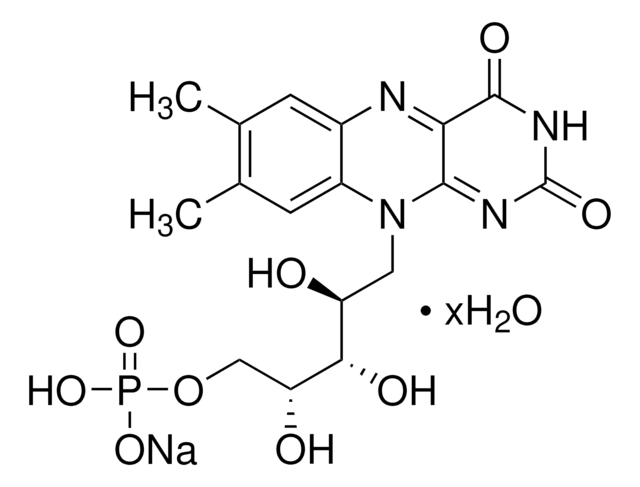R9504
(−)-Riboflavin
BioReagent, suitable for cell culture, suitable for insect cell culture, ≥98%
Synonym(s):
Lactoflavin, Vitamin B2, Vitamin G
About This Item
Recommended Products
biological source
Eremothecium ashbyii
Quality Level
product line
BioReagent
Assay
≥98%
form
powder
mol wt
Mw 376.36 g/mol
technique(s)
cell culture | insect: suitable
cell culture | mammalian: suitable
color
yellow to orange
mp
290 °C (dec.) (lit.)
solubility
0.1 M NaOH: 10 mg/mL, clear, yellow to orange
storage temp.
room temp
SMILES string
CC1=C(C)C=C(N(C[C@H](O)[C@@H]([C@H](O)CO)O)C(C2=N3)=NC(NC2=O)=O)C3=C1
InChI
1S/C17H20N4O6/c1-7-3-9-10(4-8(7)2)21(5-11(23)14(25)12(24)6-22)15-13(18-9)16(26)20-17(27)19-15/h3-4,11-12,14,22-25H,5-6H2,1-2H3,(H,20,26,27)/t11-,12+,14-/m0/s1
InChI key
AUNGANRZJHBGPY-SCRDCRAPSA-N
Looking for similar products? Visit Product Comparison Guide
General description
Riboflavin is an essential vitamin soluble in water. Milk and eggs are found to be its major sources. Riboflavin is usually bound to enzymes in all tissues. During riboflavin localization in plasma, it is bound to albumin and specific immunoglobulins.
Application
Biochem/physiol Actions
Storage Class Code
11 - Combustible Solids
WGK
WGK 1
Flash Point(F)
Not applicable
Flash Point(C)
Not applicable
Personal Protective Equipment
Choose from one of the most recent versions:
Already Own This Product?
Find documentation for the products that you have recently purchased in the Document Library.
Customers Also Viewed
Articles
How riboflavin and othercell culture components affect the performance of serum-free, protein-free cell culture systems used for biomanufacturing heterologous proteins including monoclonal antibodies. The page introduces the in vitro chemistry and biochemistry of riboflavin.
Our team of scientists has experience in all areas of research including Life Science, Material Science, Chemical Synthesis, Chromatography, Analytical and many others.
Contact Technical Service







